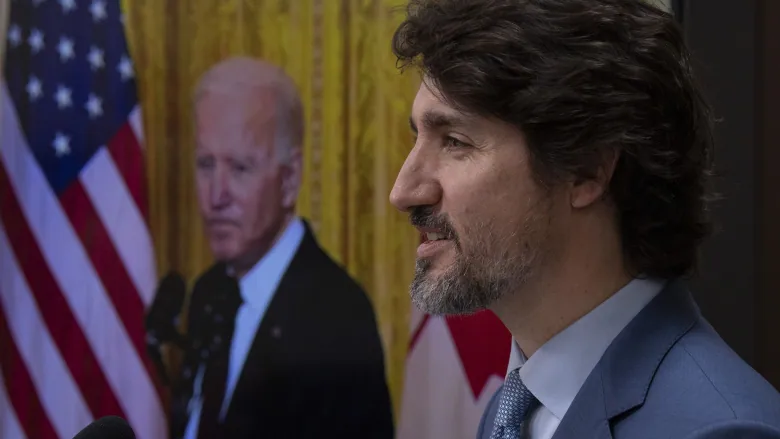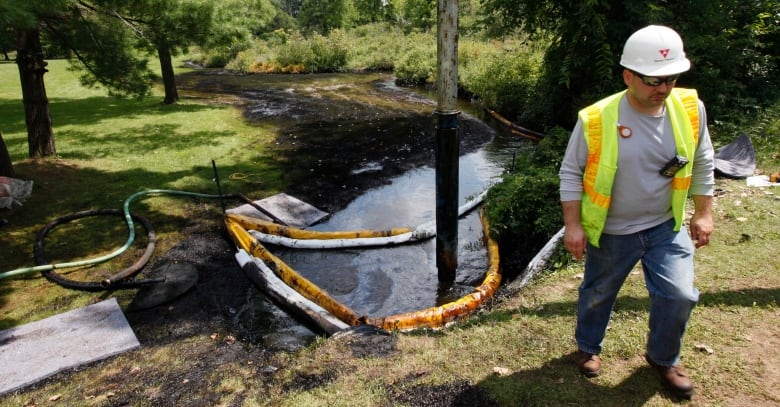Biden isn’t likely to come to Canada’s rescue in Line 5 dispute with Michigan
The Michigan state government and Enbridge remain in a court-ordered mediation process to resolve a pipeline dispute that — judged by the heated political rhetoric being employed on both sides of the border — defies compromise.

Michigan Gov. Gretchen Whitmer set tomorrow’s deadline for Enbridge to shut down its Line 5 oil and gas pipeline through the state.
It won’t be enforced. But as one deadline passes, others loom on the horizon.
The state government and Enbridge remain in a court-ordered mediation process to resolve a dispute that — judged by the heated political rhetoric being employed on both sides of the border — defies compromise.
Whitmer calls Line 5, which crosses under the Straits of Mackinac connecting Lake Superior and Lake Huron, a “ticking time bomb” and a “catastrophic” threat to the Great Lakes ecosystem.
Determined to shut down a pipeline that’s been operating since the 1950s, the governor is supported by Indigenous groups and environmentalists who vividly remember a 2010 spill from another Enbridge-operated pipeline in the state.

Natural Resources Minister Seamus O’Regan has said the continued operation of the line is “non-negotiable.” He warned again Tuesday that shutting it down would have “profound consequences” for the economies and energy security of both countries.
Line 5 now carries 540,000 barrels of petroleum products every day. Enbridge says it supplies most of the propane used in Michigan and nearly half of the supply of light crude oil, light synthetic crude oil and natural gas liquids in Ontario and Quebec.
Finding common ground among those competing positions would be a challenge for even the most skilled mediator.
Prime Minister Justin Trudeau says he wants an amicable resolution. Canada wants to avoid a repeat of the political and diplomatic scrap that erupted with U.S. President Joe Biden after he blocked the proposed Keystone XL pipeline as one of his first acts in office.
“We continue to engage very closely in the issue of Line 5. We know it is an issue of energy security for Canadians and Americans,” Trudeau told reporters during a news conference today.
“It’s why we have pushed strongly for the mediation process between Enbridge and the state of Michigan to continue. We will continue to weigh in through our embassy in Washington and with our partners because we know that the energy cooperation and partnership with the U.S. is good for citizens on both sides of the border.”
WATCH: Prime Minister Justin Trudeau on Line 5’s fate

Prime Minister Justin Trudeau spoke with reporters during the regular pandemic briefing on Tuesday. 0:37
The official line is that this dispute is between a Canadian company and a U.S. state.
But there’s no disputing the fact that Line 5 is shaping into another significant bilateral irritant in the Canada-U.S. relationship — with a president who’s supposed to be friendlier to Canadian interests, whose election was supposed to signal a more constructive relationship than the one Canada had with former president Donald Trump.
High stakes
“This isn’t an easy one,” said Peter Boehm, a Canadian senator and former diplomat who spent years posted to the United States. “The question is, at what level do you want these discussions to take place? For now, the courts seem to be the best place to find a solution.”
That doesn’t mean talks aren’t taking place at the political level. Trudeau said he and his cabinet ministers raise Line 5 at every opportunity with American officials — even as Canadian officials insist this dispute won’t come to define the Canada-U.S. relationship the way Keystone XL did for the Stephen Harper-Barack Obama era.
But the stakes are high.
The Trudeau government has hired well-connected Democrat Gordon Giffin — the U.S. ambassador to Ottawa during Bill Clinton’s second term (and no stranger to Biden’s government) — to represent Canada’s interests in the case.
Giffin filed a motion with the U.S. District Court in Michigan on Tuesday. It urges the court to “act in a manner that will ensure Line 5 is not subject to a unilateral compelled shutdown” and says that no shutdown should happen “before the governments of the United States and Canada complete their efforts to resolve this matter, pursuant to their bilateral treaty, which directly addresses transit pipelines such as Line 5.”
If all else fails, there’s a treaty
That last bit is Canada’s (forgive the reference) trump card. The 1977 transit pipeline treaty prohibits either side from blocking the shipment of oil and gas through a pipeline like Line 5 that crosses through the U.S. to connect one part of Canada to another.
Invoking the treaty would be a last resort — a signal that all the lobbying efforts have failed and that President Biden is unwilling to intervene.
“The United States is eager to work with Canada and other partners to demonstrate our collective climate leadership to put the world on a sustainable climate pathway,” a U.S. State Department spokesperson said in an email statement to the CBC.
“We are tracking closely the engagement between the state of Michigan and Enbridge on matters related to Line 5 and hope the parties can come to a mutually agreeable resolution.”

Whitmer, a Democrat, is a key Biden ally in an important swing state. The governor co-chaired Biden’s presidential campaign and the president nominated her to serve as vice chair of the Democratic National Committee.
She’s presenting her decision as an effort to protect the environment and fight climate change — which makes it even more difficult to see the Biden administration intervening on Canada’s behalf.
A spokesperson for Michigan’s Attorney General Dana Nessel told CBC the state remains determined to enforce the shutdown order.
“We need a court order that requires Enbridge to shut down in compliance with the notice,” said Nessel’s press secretary Lynsey Mukomel in a statement sent to CBC News. “We will continue to work to get that as soon as possible.”
For now, oil still still flows through Line 5. Expect to see more political talks and legal manoeuvring coming down the pipe, too.
